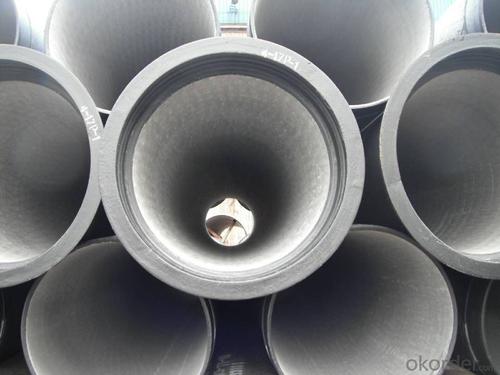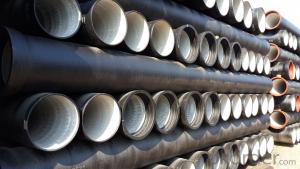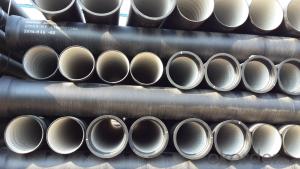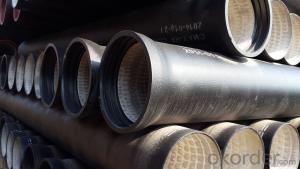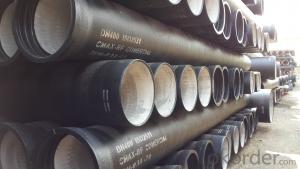DUCTILE IRON PIPE DN300
- Loading Port:
- China Main Port
- Payment Terms:
- TT OR LC
- Min Order Qty:
- -
- Supply Capability:
- -
OKorder Service Pledge
OKorder Financial Service
You Might Also Like
Specification:
1) The standard of pipe: ISO2531:1998, K9
2) Effective length: 6m
3) Inner cement line: Portland cement line as per ISO4179
4) Zinc coating: at least 130g/m2 as per ISO8179
5) Bitumen painting: at least 70um as per ISO8179
6) With 100% quantity of NBR ring, or SBR ring, or EPDM ring as per ISO4633
7) DN80mm-800mm
8) High strength, lighter than grey iron, good corrosion resistance, no furring, small flow resistance, easy fixing, long life tome about 100 yeas
9) Produced by Hangzhou chunfeng machine
10) Checked by automatic inspection equipment
11) Composition:
Chemical composition | |||
Chemical composition | Ductile Cast Iron Pipe (%) | Grey iron pipe (%) | Steel pipe (%) |
C | 3.5-4.0 | 3.2-3.8 | 0.1-0.2 |
Si | 1.9-2.6 | 1.4-2.2 | 0.15-0.4 |
Mn | 0.15-0.45 | 0.4-0.6 | 0.3-0.6 |
P | ≤0.06 | ≤0.3 | 0.02-0.03 |
S | ≤0.02 | ≤0.1 | 0.02-0.03 |
Mg | 0.03-0.06 |
|
|
12) Feature:
Mechanical properties | |||
| Ductile Cast Iron Pipe | Grey Iron Pipe | Steel Pipe |
Tensile Strength(Mpa) | ≥420 | 150-260 | ≥400 |
Yield Strength(Mpa) | ≥300 | No Confirmation | No Confirmation |
Bending Strength(Mpa) | ≥590 | 200-360 | ≥400 |
Elongation (%) | ≥10 | Neglected | ≥18 |
Brinell Hardness(HBS) | ≤230 | ≤230 | About 140 |
13) T type mechanical joint
14) Packing: in bulk or container
- Q: Are ductile iron pipes suitable for horizontal directional drilling (HDD) installations?
- Yes, ductile iron pipes are suitable for horizontal directional drilling (HDD) installations. They possess the necessary strength and flexibility to withstand the drilling process and can be easily installed underground without compromising their structural integrity.
- Q: How are ductile iron pipes protected against freeze-thaw cycles?
- Ductile iron pipes are protected against freeze-thaw cycles through several measures. Firstly, the material used in ductile iron pipes is inherently resistant to low temperatures and can withstand freezing conditions without becoming brittle or prone to cracking. Additionally, the pipes are often coated with a protective layer, such as cement mortar lining or polyethylene encasement, to provide an extra barrier against freeze-thaw damage. These coatings serve to insulate the pipe and prevent direct contact between the iron and the surrounding environment. Furthermore, ductile iron pipes are commonly designed with joints that allow for movement and flexibility, which helps to accommodate any expansion or contraction that may occur during freeze-thaw cycles. This flexibility reduces the risk of pipe breakage or damage due to the pressure exerted by freezing water inside the pipe. Moreover, proper installation practices, including adequate bedding and backfilling, are crucial in protecting ductile iron pipes against freeze-thaw cycles. Ensuring that the pipes are properly supported and surrounded by suitable materials helps to minimize the impact of freezing temperatures on the structural integrity of the pipes. Regular inspection and maintenance of ductile iron pipes are also essential in identifying any potential issues caused by freeze-thaw cycles. Periodic assessments can help detect any signs of damage or deterioration, enabling timely repairs or replacement to prevent further damage. In summary, ductile iron pipes are protected against freeze-thaw cycles through the inherent resistance of the material, protective coatings, flexible joints, proper installation practices, and regular maintenance. These measures collectively contribute to the durability and longevity of ductile iron pipes, even in cold weather conditions.
- Q: How are ductile iron pipes manufactured?
- Ductile iron pipes are manufactured through a process known as centrifugal casting, which involves the use of a spinning mold. The process begins with the selection and preparation of high-quality ductile iron, which is a type of cast iron that contains small amounts of magnesium to enhance its strength and ductility. First, the ductile iron is melted in a furnace at extremely high temperatures. Once the molten iron reaches the desired temperature, it is poured into a spinning mold. The spinning mold is designed in the shape of a pipe, and it rotates at a high speed to distribute the molten iron evenly along its inner surface. As the mold spins, the molten iron cools and solidifies against the mold walls. This rapid cooling results in a fine-grained structure and enhances the mechanical properties of the pipe, such as its strength and durability. The spinning mold continues to rotate until the pipe has completely solidified, which typically takes a few minutes. After solidification, the pipe is removed from the mold, and excess material, known as the "skin," is removed. The skin is typically removed by machining or grinding to achieve the desired dimensions and surface finish. Next, the pipe undergoes heat treatment to further enhance its mechanical properties and reduce internal stresses. Once the heat treatment is completed, the pipe is thoroughly inspected for any defects or imperfections. This includes visual inspections, non-destructive testing methods, and pressure testing to ensure the pipe meets the required specifications and standards. If any defects are detected, the pipe may be repaired or rejected depending on the severity of the issue. Finally, the pipes are coated with a protective layer to prevent corrosion and enhance their longevity. This coating can be applied through various methods, such as cement mortar lining, epoxy coating, or zinc coating. Overall, the manufacturing process of ductile iron pipes involves melting the iron, centrifugal casting, cooling, skin removal, heat treatment, inspection, and coating. This process ensures the production of high-quality pipes that possess excellent strength, durability, and resistance to corrosion.
- Q: Can ductile iron pipes be used for underground slurry pipelines?
- Yes, ductile iron pipes can be used for underground slurry pipelines. Ductile iron pipes are known for their strength and durability, making them suitable for transporting various types of slurries underground.
- Q: Does the cast iron have size 250? What's the performance?
- 1, cast iron because of low melting point, casting process performance is good, because it has been widely used.2, the relative gray iron ductile iron, have higher tensile strength and impact toughness, which has better mechanical performance.
- Q: Are ductile iron pipes resistant to biological growth?
- Yes, ductile iron pipes are generally resistant to biological growth. Ductile iron is a strong and durable material that is commonly used in water and sewage systems. Its smooth surface inhibits the growth of bacteria, fungi, and other microorganisms that can contribute to biological growth. Additionally, ductile iron pipes are often coated with protective linings or coatings, such as cement mortar or epoxy, which further enhance their resistance to biological growth. However, it is important to note that no material is completely immune to biological growth, and regular maintenance and cleaning of the pipes may still be required to ensure long-term resistance.
- Q: What is ductile iron?
- Ductile iron, after being treated with either magnesium or cerium, undergoes an improvement in its mechanical properties. This particular type of cast iron earns the name "ductile" due to its higher degree of ductility in comparison to other cast iron varieties. Ductility pertains to a material's capacity to stretch or deform without breaking. This quality renders ductile iron particularly ideal for applications that demand both high strength and resistance to wear and tear, such as pipes, automotive components, and machinery parts. The inclusion of magnesium or cerium during the manufacturing process aids in the formation of graphite within the iron's structure, contributing to its distinctive properties. This graphite formation serves to enhance the iron's flexibility and reduce its brittleness, enabling it to absorb shock and vibrations without fracturing. As a whole, ductile iron presents a fine balance between the strength of cast iron and the flexibility of steel, thereby establishing itself as a versatile material well-suited for diverse industrial applications.
- Q: What is the minimum operating temperature for ductile iron pipes?
- Ductile iron pipes typically have a minimum operating temperature of -40 degrees Celsius, showcasing its exceptional strength and ductility in cold conditions. This makes it a versatile option for various purposes, such as water and wastewater systems. Nevertheless, it is crucial to acknowledge that the specific minimum operating temperature may differ based on factors such as the grade of ductile iron employed and the requirements of the application. It is highly advisable to refer to the manufacturer's specifications and guidelines for the appropriate utilization and optimal performance of ductile iron pipes in cold temperatures.
- Q: Can ductile iron pipes be used for underground cable conduits?
- Yes, ductile iron pipes can be used for underground cable conduits. Ductile iron pipes are known for their strength, durability, and corrosion resistance, making them suitable for various applications, including underground cable conduits. Their ability to withstand heavy loads and external pressures makes them a reliable choice for protecting and housing underground cables.
- Q: Can ductile iron pipes be used for underground water treatment systems?
- Indeed, underground water treatment systems can utilize ductile iron pipes. Renowned for their robustness and longevity, these pipes are well-suited for a range of uses, including underground water treatment systems. They possess exceptional resistance to corrosion, rendering them perfect for transporting water through even the harshest subterranean surroundings. Furthermore, ductile iron pipes boast a remarkable load-bearing capacity, enabling them to withstand the immense pressure and weight exerted by the soil above. Additionally, their versatility allows for simple installation and maintenance, making them a sensible option for underground water treatment systems.
Send your message to us
DUCTILE IRON PIPE DN300
- Loading Port:
- China Main Port
- Payment Terms:
- TT OR LC
- Min Order Qty:
- -
- Supply Capability:
- -
OKorder Service Pledge
OKorder Financial Service
Similar products
Hot products
Hot Searches
Related keywords




